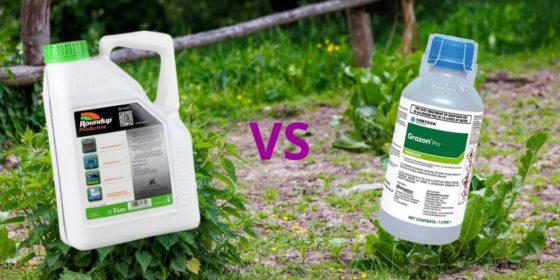Total vs selective weed killers: Which should you choose?
There's a bewildering array of weed killers on the market, all claiming to offer different benefits. Some boast rapid reaction times, removing unwanted vegetation within hours. Others are designed to deliver long-lasting results, while some are chosen for their non-hazardous formulations.
With all of these different products vying for your attention, selecting the right weed killer for the job can seem like a tall order. If you're not sure where to tart, we're going to cover the two main types of weed killer in this guide. Not only will we explain what each type does and how they differ from one another, but we'll also help you decide which one is right for you - and suggest a few products that you might find useful.
What is a total weedkiller?
Otherwise known as a non-selective weed killer, this type of product is designed to provide a complete, all-encompassing weed control solution. Most total weed killers use glyphosate as their primary active ingredient, which works by blocking the plant's production of proteins, which is needs to survive and grow.
As a result, total weed killers can kill practically any plant (not just the ones you are wanting to get rid of). This is a great thing in certain circumstances, however it is important to be careful where you are spraying as if you are trying to control weeds in amongst plants you are wanting to keep you would not want the total weed killer to come in to contact with these as they would also be controlled! Total weed killers also won't prevent new weeds from germinating - you'll need to reapply the product each time new weeds develop.
What's a selective weedkiller?
Selective weed killers won't kill everything in their path. They're designed to only work on specific plants, with a variety of unique formulations available to tackle specific types of weeds while avoiding grasses. They work by stimulating excessive growth in the target plant, so much so that it's no longer able to sustain its rate of growth. The plant will then die.
Which is right for you?
If you have weeds growing through hard standing areas, gravel or around buildings, you probably want a total weed killer. These products will seep through the cracks or gaps, killings the weeds quickly and effectively. It's for this reason that total weed killers are often used during construction projects and across industrial areas, where harm can't be caused to areas of grass.
If, on the other hand, you need to remove a specific type of weed from a lawn, paddock or piece of turf, selective weed killers are the way to go. They won't harm surrounding grasses and will target only the plant you are wanting to get rid of. The surrounding vegetation will be unharmed so you won't have to worry about killing your grass.
If you do choose a selective weed killer, make sure that you get the right one. If you're not sure which type of weed you're fighting with, ask our experts for advice before you place your order.
Products we recommend
Now you know the difference between each type of weed killer, let's take a look at a few of our most popular products.
Total Weed Killers
- Roundup ProActive: A favourite of professionals, ProActive is a glyphosate weed killer that delivers consistent results. As a bonus, it's been certified as non-hazardous by COSHH, making it safe for both humans and pets
- Gallup Biograde Amenity: Containing a similar concentration of glyphosate, this great-value product works on everything from grass weeds to perennial broad-leaved weeds and woody plants
Selective Weed Killers
- Grazon Pro: One of our strongest-selling products, Grazon Pro is a formidable selective treatment designed for pastures. This product tackles docks, thistles, nettles, bramble, broom and more - all without harming your grass
- Depitox 500: Another hugely popular product, Depitox 500 is a highly effective grassland weed killer designed for use with a boom sprayer. It can remove the likes of buttercup, plantain, daisy, dandelion, lesser celandine, self-heal, yarrow and ragwort and is safe to use on agricultural or amenity grassland and turf
Any questions?
We hope this guide answered your questions, but if you have any additional queries, please don't hesitate to contact our team.





